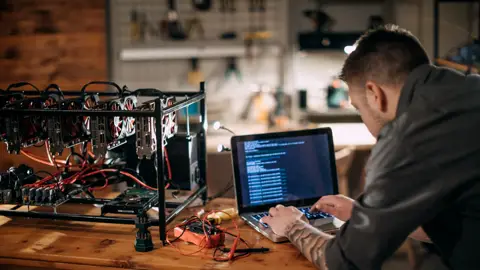Blockchain, Web3 Jobs
The rise of blockchain technology and the emergence of Web3 have revolutionized digital interactions, transactions, and applications. As these technologies continue to evolve, they are creating a plethora of high-paying job opportunities for skilled professionals. This article explores some of the most in-demand job categories in the blockchain and Web3 space, including Blockchain Developers, Smart Contract Developers, Web3 Developers, and Blockchain Quality Assurance Engineers.

What is Blockchain?
Blockchain is a decentralized, distributed ledger technology that records transactions across multiple computers, making it difficult to alter records. Initially introduced for Bitcoin, blockchain applications now span various industries, including finance, supply chain management, and healthcare.
Key Features of Blockchain:
-
Decentralization
-
Transparency
-
Immutability
-
Security
What is Web3?
Web3, or Web 3.0, represents the next evolution of the internet, where decentralized applications (dApps) and blockchain technology play a central role. Web3 aims to create a more decentralized, user-centric internet.
Key Features of Web3:
-
Decentralization
-
Interoperability
-
User Control
-
Smart Contracts
Blockchain Developer
Key Responsibilities:
-
Designing and developing blockchain architectures.
-
Implementing smart contracts on various blockchain platforms.
-
Integrating blockchain technology with existing systems and applications.
-
Ensuring the security and scalability of blockchain solutions.
-
Collaborating with cross-functional teams to deliver blockchain-based products.
Important Skills:
-
Proficiency in programming languages such as Solidity, Python, and JavaScript.
-
In-depth understanding of blockchain protocols and consensus mechanisms.
-
Familiarity with blockchain platforms like Ethereum, Hyperledger, and Bitcoin.
-
Knowledge of cryptography and security best practices.
Smart Contract Developer
Key Responsibilities:
-
Designing and implementing smart contracts on platforms like Ethereum.
-
Ensuring the security and efficiency of smart contracts.
-
Testing and debugging smart contracts to prevent vulnerabilities.
-
Collaborating with other developers to integrate smart contracts into dApps.
Important Skills:
-
Proficiency in Solidity.
-
Understanding of blockchain platforms and smart contract requirements.
-
Knowledge of cryptographic protocols and security standards.
Web3 Developer
Key Responsibilities:
-
Designing and developing decentralized applications (dApps) using blockchain technology.
-
Integrating blockchain APIs and services into web applications.
-
Building user interfaces (UI) and user experiences (UX) for dApps.
-
Ensuring the security and performance of Web3 applications.
Important Skills:
-
Proficiency in front-end development technologies.
-
Experience with blockchain platforms like Ethereum and Polygon.
-
Knowledge of smart contracts and decentralized protocols.
Blockchain Quality Assurance Engineer
Key Responsibilities:
-
Developing and executing test plans for blockchain applications.
-
Identifying and reporting bugs and vulnerabilities.
-
Ensuring blockchain applications meet performance and security requirements.
-
Collaborating with developers to resolve issues and improve quality.
Important Skills:
-
Proficiency in blockchain technology and its principles.
-
Experience with smart contract testing and security audits.
-
Familiarity with testing frameworks and tools.
Job Outlook and Demand
The demand for skilled professionals in blockchain and Web3 is rapidly increasing due to enterprise adoption, the rise of DeFi, and the growth of the Web3 ecosystem. According to LinkedIn, blockchain is one of the fastest-growing skills in demand.
Conclusion
The blockchain and Web3 industries are evolving rapidly, creating wealth of high-paying job opportunities. Whether you're interested in developing smart contracts, building decentralized applications, or ensuring the quality of blockchain-based systems, there are plenty of roles to choose from. As the decentralized web continues to grow, the demand for skilled Blockchain and Web3 professionals will only increase. Are you ready to embark on this exciting journey?





